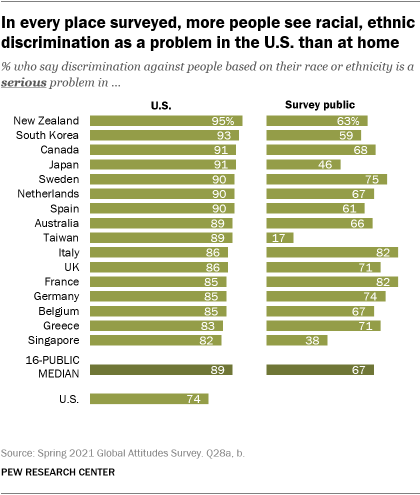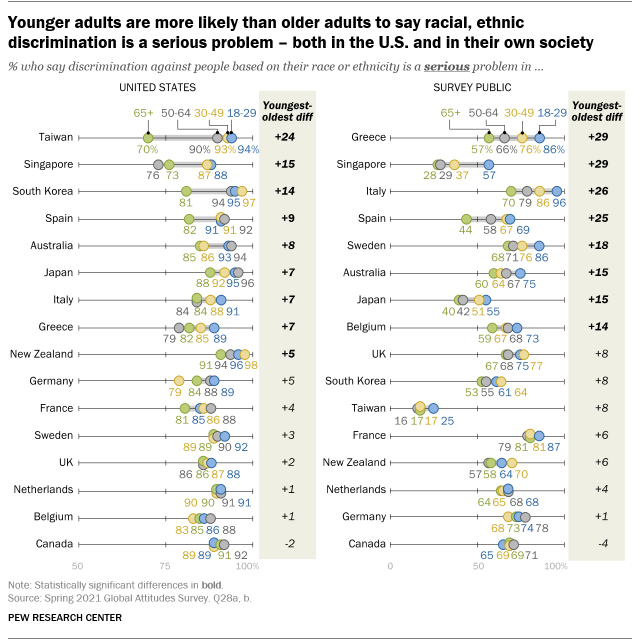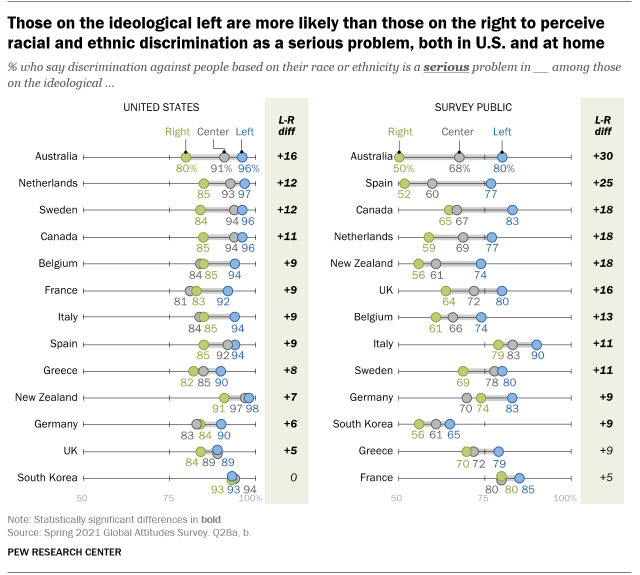Concerns about racial and ethnic discrimination are widespread in most of the 17 advanced economies surveyed by Pew Research Center this spring. Majorities of adults in 14 of these places say discrimination on the basis of race or ethnicity is a somewhat or very serious problem in their own society – including around three-quarters or more in Italy, France, Sweden, Germany and the United States. Only in Japan, Singapore and Taiwan do fewer than half say such discrimination is a serious problem.
This Pew Research Center analysis focuses on comparing attitudes about whether racial and ethnic discrimination is a problem within a given survey public and whether it is a problem in the United States. For non-U.S. data, this post draws on nationally representative surveys of 16,254 adults from March 12 to May 26, 2021, in 16 advanced economies. All surveys were conducted over the phone with adults in Canada, Belgium, France, Germany, Greece, Italy, the Netherlands, Spain, Sweden, the United Kingdom, Australia, Japan, New Zealand, Singapore, South Korea and Taiwan.
In the U.S., we surveyed 2,596 adults from Feb. 1 to 7, 2021. Everyone who took part in the U.S. survey is a member of the Center’s American Trends Panel (ATP), an online survey panel that is recruited through national, random sampling of residential addresses. This way nearly all adults have a chance of selection. The survey is weighted to be representative of the U.S. adult population by gender, race, ethnicity, partisan affiliation, education and other categories.
This study was conducted in places where nationally representative telephone surveys are feasible. Due to the coronavirus outbreak, face-to-face interviewing is not currently possible in many parts of the world.
Here are the questions used for this analysis, along with responses. Visit our methodology database for more information about the survey methods outside the U.S. For respondents in the U.S., read more about the ATP’s methodology.
But even as sizable majorities in these places see racial and ethnic discrimination as a serious problem, even bigger majorities see it as an issue in the U.S. A median of 89% across the 16 non-U.S. publics surveyed describe racial and ethnic discrimination in the U.S. as a somewhat or very serious problem. That includes at least nine-in-ten who take this position in New Zealand, South Korea, Canada, Japan, the Netherlands, Spain and Sweden.
Across most of the places surveyed, younger adults tend to be more likely than older people to see discrimination as a problem, whether in their own society or in the U.S. For example, among Spaniards, 69% of those under age 30 think racial and ethnic discrimination in their own society is a serious problem, compared with 44% of those ages 65 and older. Younger Spaniards are also more likely than older Spaniards to see discrimination in the U.S. as a serious problem – though age-related differences in opinion about American discrimination are less pronounced, both in Spain and elsewhere.
Women in most of the advanced economies surveyed tend to see discrimination at higher rates than men. In the U.S., for example, 80% of women say discrimination against people based on their race or ethnicity is a somewhat or very serious problem, compared with 68% of men. Gender differences of around 10 percentage points are also evident in Canada, Germany, Greece, the Netherlands, Spain, Sweden, New Zealand and South Korea, both when it comes to discrimination locally and in the U.S. (though differences for the U.S. are again less pronounced).
In many places surveyed, those on the ideological left are more likely than those on the right to see racial and ethnic discrimination as a serious problem, both in their own society and in the U.S. The ideological gap on this question is widest in the U.S. itself: 92% of those on the left (liberals, in common U.S. parlance) say racial and ethnic discrimination is a serious problem, compared with 47% of those on the right (conservatives), a difference of 45 points. The next-largest ideological gap is in Australia, where 80% of those on the left and 50% of those on the right hold the view that discrimination is a serious problem in Australia. In general, people on the ideological left are also more likely than those on the right to say discrimination in the U.S. is a serious problem.
Attitudes sometimes also differ by educational level, especially when it comes to discrimination in the U.S. In Taiwan, for example, 95% of those with at least a postsecondary degree describe discrimination as a serious problem in the U.S., compared with 77% of those with less than a postsecondary degree. On the other hand, when it comes to perceptions of domestic discrimination, education only plays a role in Singapore, Japan and South Korea, with more educated people more likely to cite discrimination as a serious problem.
Note: Here are the questions used for this analysis, along with responses. Visit our methodology database for more information about the survey methods outside the U.S. For respondents in the U.S., read more about the ATP’s methodology.


